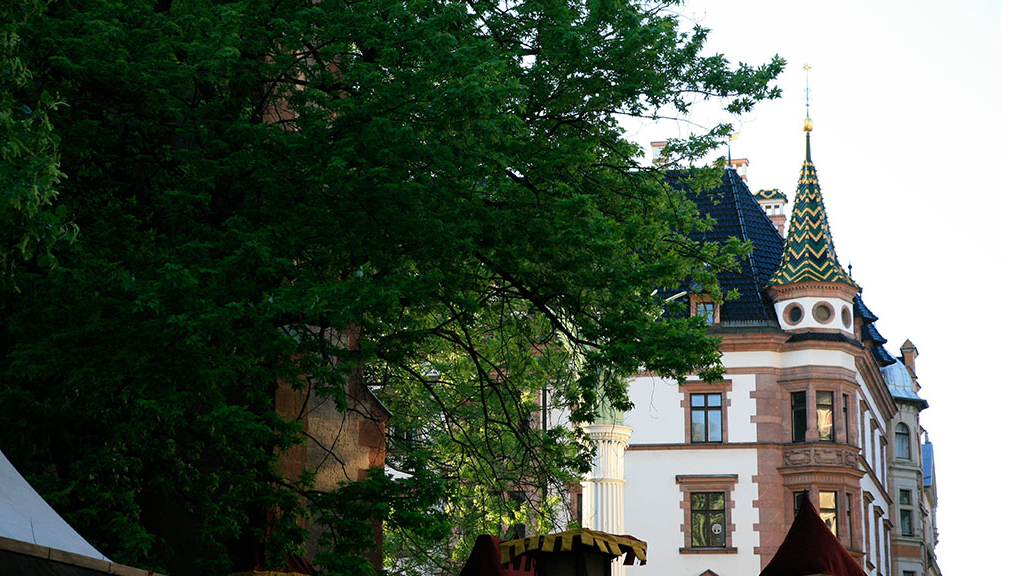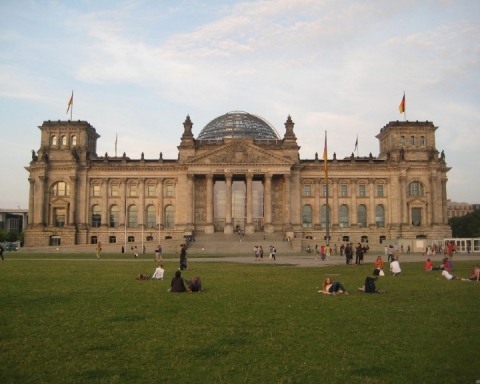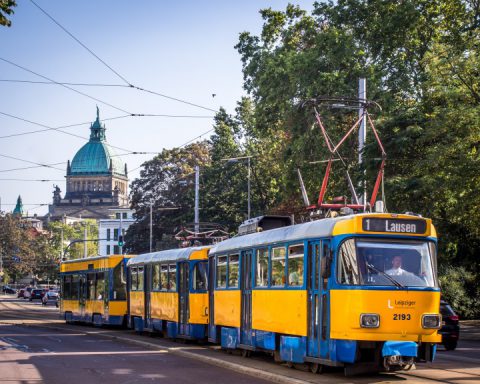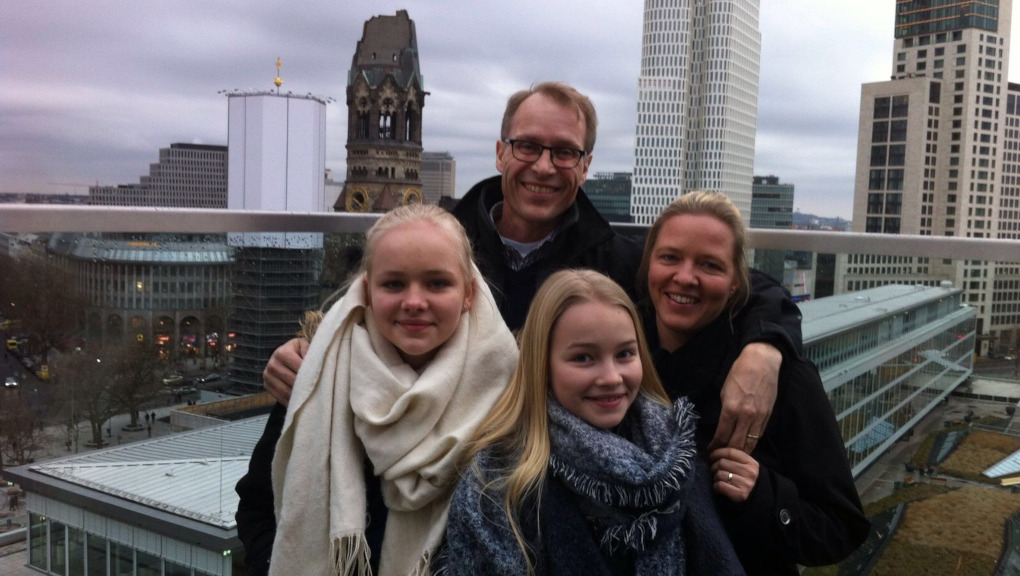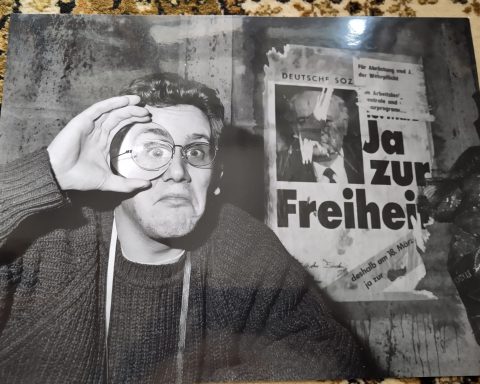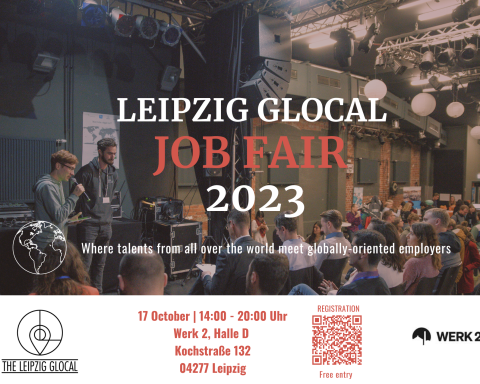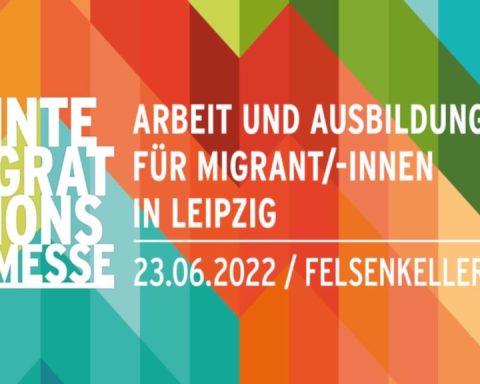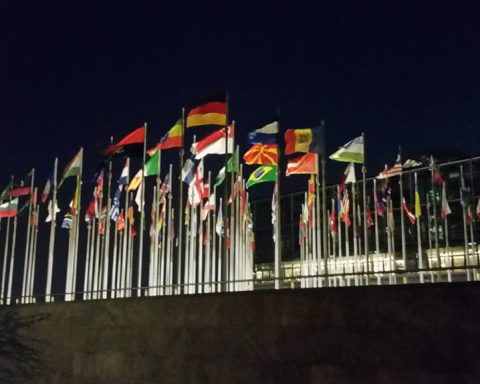Marcel Pruß and Jürgen Kasek (Grüne) live in Leipzig and are candidates for City Council in Circuit 2, Leipzig East. This interview with them is part of our series on the City Council and European Parliament elections of 26 May 2019. We invited all Leipzig candidates of all major parties (CDU, SPD, Grüne, Die Linke, FDP and AfD) to answer the questions below. Our aim is for our audience to get to meet the candidates and know their political stances better. All questions and answers are provided in German and English. The answers to the questions and any other opinions provided by them are the candidates’ own.
Marcel Pruß und Jürgen Kasek (Grüne) leben in Leipzig und kandidieren für den Stadtrat im Wahlkreis 2, Leipzig-Ost. Dieses Interview mit ihnen ist Teil unserer Reihe über die Stadtrats- und Europawahlen am 26. Mai 2019. Wir haben alle Leipziger Kandidat_innen aller großen Parteien (CDU, SPD, Grüne, Die Linke, FDP und AfD) eingeladen, die folgenden Fragen zu beantworten. Unser Ziel ist, dass unser Publikum die Kandidat_innen und ihre politischen Standpunkte besser kennenlernt. Alle Fragen und Antworten zeigen wir in deutscher und englischer Sprache. Die Antworten auf die Fragen und alle anderen von ihnen ausgedrückten Meinungen sind allein die der Kandidaten.

Quelle/Source: Amt für Statistik und Wahlen Leipzig
Wenn man über lokale oder regionale Politik redet, schlafen viele Zuhörer ein… Lokale oder regionale Politik bzw. Wahlkämpfe sind für manche nicht so wichtig oder „sexy“ wie nationale Politik und Bundestagswahlen. Warum sollten sich Menschen für Politik auf lokaler oder regionaler Ebene interessieren? Warum ist diese Ebene der Politik Ihrer Meinung nach wichtig?
When one talks about local or regional politics, many listeners fall asleep… local or regional politics or election campaigns are for some not as important or “sexy” as national politics and federal elections. Why should people be interested in local or regional politics? Why do you consider this level of politics to be important?
Pruß: Kommunale Selbstverwaltung hat in Deutschland Verfassungsrang. Städte und Gemeinden verfügen hierzulande über eine Fülle von Kompetenzen und Möglichkeiten, die weltweit ihresgleichen sucht. Auf welchen Straßen Sie nach Hause oder zur Arbeit fahren, ob es einen Radweg gibt, eine Busverbindung oder eine Straßenbahn, wo Sie ein Haus oder eine Fabrik bauen dürfen, wie die Versorgung mit Wasser und die Entsorgung von Müll und Abwasser funktioniert, welche Kindertagesstätte und Schulen es in ihrem Viertel gibt, wo das nächste Krankenhaus steht und die nächste Bibliothek, ja häufig sogar woher der Strom kommt und die Wärme fürs Haus – all dies und noch viel mehr wird in Ihrem Rathaus weitgehend eigenverantwortlich entschieden.
Für die meisten Menschen sind diese Dinge in ihrem Alltag sehr viel wichtiger als der Spitzensteuersatz
In Germany, local self-government has a constitutional status. In this country, cities and municipalities possess a plethora of competences and opportunities that are second to none in the world. On which roads you drive home or to work, whether there’s a bike path, a bus connection or a tram, where you may build a house or a factory, how the supply of water and disposal of garbage and sewage works, which daycare center and schools there are in your quarter, where the nearest hospital is and the nearest library, and often even where the electricity and heat for the house come from – all this and much more is decided in your town hall, largely on the latter’s own responsibility.
For most people, these things are much more important in their everyday lives than the top tax rate.
Kasek: Auf kommunaler Ebene werden die Entscheidungen getroffen, die viele Menschen am unmittelbarsten erleben und sie am unmittelbarsten betreffen, egal ob das die Bauplanung ist, die Verkehrsgestaltung, der Schulnetzplan oder andere Themen. Jeder von uns will im Grunde genommen zufrieden leben. Dazu gehört bei vielen ein auskömmliches Einkommen, das Gefühl von Sicherheit und eine ruhige Wohnlage. Die Gesetze werden auf einer anderen Ebene gemacht, aber die kommunale Verwaltung, zu der der Stadtrat gehört, setzt diese Gesetze um. Wir gestalten die Gesellschaft mit und das sollte jeden von uns interessieren.
It’s at the local level that decisions are made which many people experience most directly, and by which they are most directly affected – no matter if it’s construction planning, traffic design, the plan for the school network, or other issues. Basically, each of us wants to live a satisfied life. For many, this includes a sufficient income, the feeling of security and a quiet residential area. The laws are made at a different level, but the municipal administration, to which the city council belongs, implements those laws. We help shape society and this should be of interest to all of us.
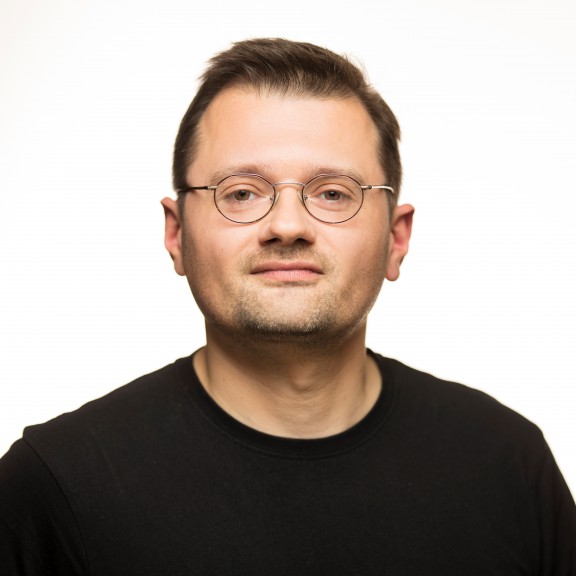
Für viele junge Menschen ist Leipzig ein attraktiver Ort, um zu studieren oder um eine Ausbildung zu machen. Viele von ihnen finden danach aber keinen passenden Arbeitsplatz und müssen in andere Städte wie Berlin, München oder Hamburg ziehen. Das Bizarre dabei ist, dass Sachsen und Leipzig viel Geld ausgeben, um Arbeitskräfte auszubilden, die dann aber gar nicht in Sachsen, sondern in anderen Bundesländern arbeiten. Was kann man auf der Ebene der lokalen oder regionalen Politik machen, damit in Leipzig ausgebildete junge Leute hier eine langfristige Perspektive haben?
For many young people, Leipzig is an attractive place to study or do vocational training. However, many of them can’t find a suitable job afterwards and have to move to other cities such as Berlin, Munich or Hamburg. The bizarre thing is that Saxony and Leipzig spend a lot of money on training people who then work not in Saxony, but in other German regions. What can you do at the level of local or regional politics to give young people trained in Leipzig long-term prospects here?
Pruß: Unsere kommunale Wirtschaftspolitik muss sich ändern. Leipzig bietet gute Ausbildungs- und Studienbedingungen und zieht damit bildungswillige junge Menschen an. Doch anschließend können wir die qualifizierten Menschen nicht in Leipzig halten, weil die Verdienstmöglichkeiten mit anderen Wirtschaftsstandorten nicht mithalten können. Wir wollen erreichen, dass Menschen für ihre Arbeit fair bezahlt werden – dafür sollten wir unsere Wirtschaftsförderung neu ausrichten. Wir brauchen hier in Leipzig auch einen starken Mittelstand, der Arbeitsplätze und Einkommen für alle Qualifikationen sichert, denn die Betriebe zahlen ihre Umsatzsteuer hier vor Ort und bieten langfristige Optionen, z.B. für Familien.
Our local economic policies must change. Leipzig offers good training and study conditions and thus attracts young people willing to learn. But afterwards, we can’t keep the qualified in Leipzig because the opportunities for income can’t keep up with other business locations. We want to achieve that people get fair pay for their work – for that, we should realign our economic development program. We also need strong medium-sized companies here in Leipzig that secure jobs and income for all qualifications, because those companies pay their sales taxes locally and offer long-term options – for families, for example.
Kasek: Das Problem ist oft, dass Arbeitsplätze im höher bezahlten Bereich fehlen. Die Stadt selber kann durch eine geschickte Ansiedlungspolitik einerseits und verstärkte Förderung von Selbstständigen und Kreativen andererseits dazu beitragen, dass Menschen trotzdem bleiben. Dazu gehören im Übrigen auch bezahlbare Wohnungen. Wenn das Durchschnittseinkommen relativ niedrig ist und die Lebenshaltungskosten auch, passt das zusammen. Bei niedrigen Einkommen und hohen Lebenshaltungskosten gibt es keinen Bleibegrund. Hier kann die Stadt steuernd eingreifen.
The problem often is that there’s a lack of jobs in the higher-paid segment. The city itself can contribute to people staying in the city all the same by means of a smart settlement policy on the one hand, and increased support for self-employed and creative people on the other. This also includes affordable apartments. If the average income is relatively low and the cost of living as well, this goes well together. With low income and high living costs, there’s no reason to stay. Here, the city can intervene to control the situation.
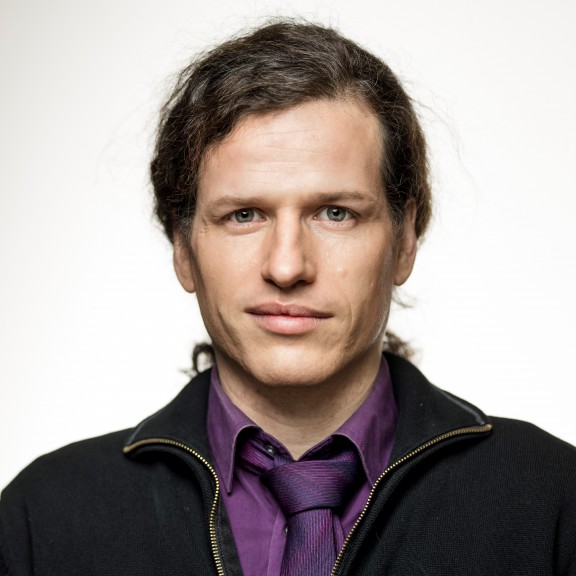
Für viele junge Familien ist es schwierig, in Leipzig zu bleiben, weil es relativ wenige Kitas gibt und die Mietpreise jedes Jahr steigen. Wie sollten diese Probleme Ihrer Meinung nach gelöst werden?
For many young families, it’s difficult to stay in Leipzig because there are relatively few day-care centers, and rental prices rise every year. How do you think these problems should be solved?
Pruß: In den letzten Jahren ist Leipzig stark gewachsen. Pro Jahr entschieden sich durchschnittlich 10.000 Menschen, ihren Lebensmittelpunkt nach Leipzig zu verlegen. Das sorgt für „Wachstumsschmerzen“ wie Kitaplatzmangel und steigende Mieten. Inzwischen hat sich das Wachstum verlangsamt, die Stadt konnte mit dem Kitabau aufholen. Doch das Ende ist noch nicht erreicht. Die steigenden Mieten sind ein Problem, welches nun intensiv angegangen werden muss.
In recent years, Leipzig has strongly grown. Each year, an average of 10,000 people decided to make Leipzig the center of their lives. This causes “growth pain,” such as a shortage of daycare spots and rising rents. In the meantime, growth has slowed down, and the city has been able to catch up on building daycare centers. But the end has not yet been reached. Rising rents are a problem that must now be intensively tackled.
Kasek: Die Verwaltung muss einerseits im Bereich der Bauplanung schneller werden und kann andererseits durch Milieuschutzsatzungen und das kommunale Vorkaufsrecht stärker gestaltend eingreifen, um zu verhindern, dass in einigen Vierteln die Mieten zu stark steigen. Mehr Bauen einerseits und stärker regulierend eingreifen andererseits wäre die Lösung.
The administration must, on the one hand, become faster in the area of construction planning so that it can intervene to a greater extent by means of milieu protection statutes, as well as the municipal first option to buy in order to prevent rents in some quarters from rising too sharply. More building on the one hand and more regulatory intervention on the other would be the solution.
Nach den Ereignissen in Chemnitz letztes Jahr ist der Ruf Sachsens vor allem in Bezug auf seine Weltoffenheit für viele Leipziger, Deutsche und Menschen in anderen Ländern schlechter geworden. Was werden Sie tun, um Sachsens Ruf in dieser Hinsicht zu verbessern?
After the events in Chemnitz last year, Saxony’s reputation has deteriorated for many Leipzigers, Germans and people in other countries, regarding especially its openness to the world. What will you do to improve Saxony’s reputation in this respect?
Pruß: Dazu kann jeder seinen Beitrag leisten. Ich selber arbeite als Bildungsreferent insbesondere mit Kindern und Jugendlichen zu genau diesen Themen – Toleranz und Weltoffenheit. Mit Positivstadtrundgängen, bei denen ich als Stadtführer mit meinen Gästen interessante Orte und Geschäfte aufsuche, mache ich die Globalisierung und den Weg von Alltagsprodukten erkennbar. Bei konsumkritischen Stadtrundgängen gehen wir auf Entdeckungsreise zu Problemen verschiedener Produktgruppen und Produktionsbedingungen und wie alle beim Einkauf gerechten Handel fördern können. Dabei arbeite ich gegen Vorbehalte und zeige alternative Sichtweisen auf.
To this, everyone can contribute. As an education consultant, I work, especially with children and adolescents, precisely on those topics – tolerance and cosmopolitanism. With positive city tours, where as a city guide I visit interesting places and shops with my guests, I render globalization and the itinerary of everyday products recognizable. On city tours critical of consumption, we go on a discovery tour of problems of different groups of products and conditions of production, and how everyone can promote fair trade when shopping. Thus, I work against prejudices and show alternative perspectives.
Kasek: Mir gefällt die Frage nach dem Image nicht. Primär kann es nicht darum gehen, dass wir ein gutes Image haben, sondern nur darum, dass alle Menschen hier gut leben können und wir gesellschaftliche und kulturelle Teilhabe für alle Menschen garantieren. Probleme gilt es zu erkennen, zu benennen, zu analysieren, und dann müssen wir gemeinsam Lösungen finden. Die bislang vor allen Dingen von der CDU angewandte „Lösung“, Probleme zu ignorieren oder zu relativieren, funktioniert offensichtlich nicht.
Wenn wir uns dem Problem stellen, dass es Vorurteile gibt, und wir gemeinsam an Veränderungen arbeiten und versuchen darauf hinzuwirken, dass Vorurteile und diskriminierendes Verhalten abgebaut werden, ändert sich das Image von alleine.
I don’t like the question about image. Primarily, it can’t be about having a good image, but all people need to live here well and we need to guarantee social and cultural participation for all people. Problems need to be identified, named, analyzed, and then we, together, must find solutions. The “solution” hitherto applied especially by the CDU to ignore or relativize problems obviously doesn’t work.
If we acknowledge the problem that there are prejudices, and we work on changes together and try to reduce prejudices and discriminatory behavior, the image will change by itself.

Viele Arbeitgeber in Leipzig hatten in den letzten Jahren Schwierigkeiten, qualifizierte Nicht-EU-Arbeitskräfte in Bereichen mit Arbeitskräftemangel zu beschäftigen, weil die Ausländerbehörde entweder Anträge zu langsam bearbeitet oder viel strenger ist als in anderen deutschen Städten. Was sollte die Politik hier Ihrer Meinung nach tun?
In recent years, many employers in Leipzig have had difficulties employing qualified non-EU workers in areas with labor shortages because the Foreigners’ Authority either processes applications too slowly or is much stricter than in other German cities. What do you think politicians should do about this?
Pruß: In diesem Bereich habe ich bisher wenig Erfahrung gesammelt. Grundsätzlich finde ich es wichtig, dass Prozesse in Ausländerbehörden transparent verlaufen und alle Behörden interkulturelle Kompetenzen mitbringen oder darin geschult werden. Sprachkenntnisse seitens der Behörden sollten beim Personal bereitgehalten werden. Ich wünsche mir für Leipzig viele Arbeitgeber und Arbeitgeberinnen, die Migranten Ausbildungs- und Arbeitsstellen anbieten. Dazu sollte die Stadt Leipzig ihren Beitrag leisten und diese Arbeitgeber fördern. Der Migrantenbeirat der Stadt ist als interkulturelles Gremium ein wichtiger Partner für die Begleitung dieser notwendigen Entwicklungen.
In this area, I’ve so far had little experience. Basically, I think it’s important that processes within foreigner authorities run in a transparent manner, and that all authorities possess intercultural skills or are trained in them. Language skills on the authorities’ part should be made available within the staff. I would like to see many employers in Leipzig who offer migrants training and jobs. The City of Leipzig should make its contribution to that and support those employers. As an intercultural body, the city’s Migrant Advisory Council is an important partner for accompanying those necessary developments.
Kasek: (Keine Antwort.)
(No answer.)
Klimawandel trifft jeden Ort. Können Sie kurz erläutern, was Ihre Meinung zur aktuellen regionalen Klimapolitik ist?
Climate change affects every place. Can you briefly explain what your opinion is on current regional climate policy?
Pruß: Welche Klimapolitik? Bundesweit werden die vereinbarten Klimaziele verfehlt, Sachsen verharrt in der Braunkohle und Leipzig traut sich nicht, konsequent die Verkehre im Umweltverbund (ÖPNV; Rad, Fuß) zu fördern. Da gibt es also noch sehr viel zu tun für Grüne Politik.
What climate policy? The agreed climate targets are missed all over Germany, Saxony sticks to brown coal, and Leipzig doesn’t dare to consistently promote EcoMobility’s modes of transport (local public transport; bicycle, foot). So there’s still a lot to do for Green policy.
Kasek: Aus meiner Sicht könnte hier noch mehr passieren. Auch wenn Leipzig zum Teil auf einem richtigen Weg ist, gibt es einiges zu tun. Es ist unverständlich, dass nach wie vor nicht alle Baumfällungen auch in der Stadt komplett ausgeglichen werden, denn Bäume sind für das Mikroklima entscheidend und im Sommer wichtige Schattenspender. Weiterhin wünsche ich mir, dass Leipzig seine Anstrengungen verstärkt, mehr Menschen zu motivieren, das private Fahrzeug stehen zu lassen und stattdessen auf andere Verkehrsarten auszuweichen, um nicht nur die Lebensqualität in der Stadt zu erhöhen, sondern auch zur Reduktion von Schadstoffen beizutragen. Dazu braucht es aber eine Politik, die die richtigen Anreize setzt und primär die Verkehrsarten des Umweltverbundes stärkt, um den Menschen ein Angebot zum Umsteigen zu machen.
In my view, more could happen here. Even if Leipzig is partly on the right track, there’s still a lot to do. It’s incomprehensible that still not all felled trees are fully compensated for also within the city, since trees are crucial for the microclimate and offer valuable shade in summer. Furthermore, I hope that Leipzig increases its efforts to motivate more people to leave their private vehicles behind and instead switch to other modes of transport in order to not only increase the quality of life in the city, but also contribute to the reduction of pollutants. This, however, requires a policy that sets the right incentives and primarily strengthens EcoMobility’s modes of transport in order to offer people an opportunity to switch to EcoMobility.

Wie sehen Sie Leipzig und Sachsen im Jahr 2040?
How do you see Leipzig in the year 2040?
Pruß: Entspannt, grün, lebenswert, weltoffen.
Relaxed, green, worth living, cosmopolitan.
Kasek: Ich gehe davon aus, dass Sachsen bis 2040 in einem Mitteldeutschen Bundesland aufgegangen ist, in dem dann Leipzig aufgrund seiner Größe und Bedeutung Regierungssitz ist.
Für Leipzig will ich meinen Beitrag dazu leisten, dass es bezahlbare Wohnungen gibt, die Verkehrsprobleme gelöst sind und die Menschen gut und gerne hier leben, weil hier die Mischung aus Natur, Kultur und Job stimmt. Das wäre was. Ich glaube, das ist möglich, wenn wir alle gemeinsam daran arbeiten.
I assume that by 2040, Saxony will have been absorbed by a Central German Federal State, where Leipzig is the government’s seat due to its size and importance.
For Leipzig, I want to make my contribution to ensuring that there are affordable apartments, that traffic problems are solved and that people live here well and gladly, because here, the mix of nature, culture and job conditions is sound. That would be something. I think that’s possible if we all work on it together.

